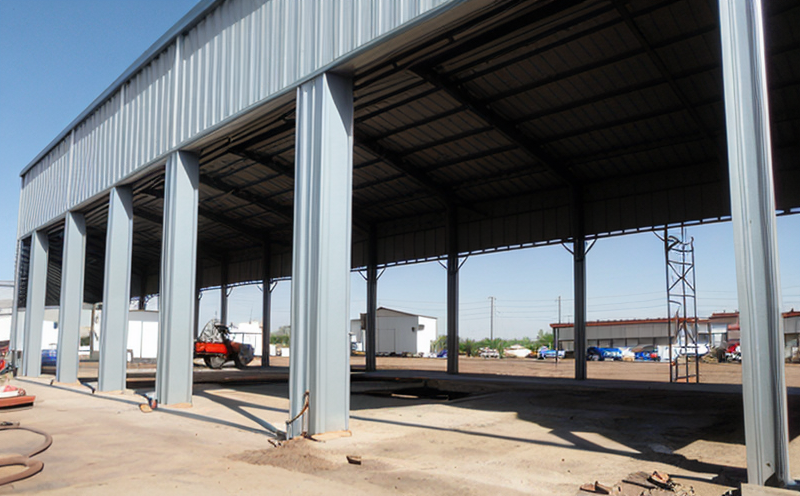ASTM A370 Shear Strength Testing of Steel
The ASTM A370 standard is one of the most widely recognized standards in metal testing, particularly for steel products. This service focuses on the shear strength testing of steels as specified by ASTM A370. The primary purpose of this test is to determine how a steel specimen behaves under shearing forces, which is essential for understanding its structural integrity and performance.
ASTM A370 covers several aspects of mechanical testing on metallic materials, including tensile testing, bend testing, notched bar impact tests, and flattening tests. However, this service specifically addresses shear strength testing, a critical aspect in the design and certification of structural components such as beams, columns, and other load-bearing structures.
The test involves subjecting a steel specimen to shear forces until it fails. The shear strength is determined by measuring the force required to cause failure and dividing this by the cross-sectional area of the specimen. This information is crucial for ensuring that steel products can withstand the expected loads without failing catastrophically.
Specimens used in this test are typically rectangular or cylindrical shapes, depending on the type of steel being tested. Specimen preparation involves machining the material to precise dimensions and tolerances as specified by ASTM A370. Proper specimen preparation is critical because even minor deviations can lead to inaccurate results.
Instrumentation for shear strength testing includes hydraulic presses capable of generating significant forces, strain gauges, and data acquisition systems to capture force-displacement relationships during the test. The use of advanced instrumentation ensures accurate measurement and reproducibility of results, which is vital for quality assurance in manufacturing processes.
The procedure outlined in ASTM A370 provides detailed instructions on how to perform the shear strength test, including the preparation of specimens, setup of equipment, application of loads, and analysis of data. Compliance with these procedures ensures that the testing results are reliable and can be compared across different facilities and laboratories.
ASTM A370 also specifies acceptance criteria for the shear strength test results. Specimens must meet specific minimum values for shear strength to pass the test. These thresholds ensure that only steel products with sufficient structural integrity are approved for use in construction projects.
Understanding ASTM A370 is important not just for quality managers and compliance officers but also for R&D engineers and procurement specialists who need to ensure that materials meet strict performance standards. By adhering to these standards, manufacturers can produce high-quality steel products that are safe and reliable in a wide range of applications.
- ASTM A370 helps in ensuring the structural integrity of steel components used in buildings and infrastructure projects.
- The test results provide critical data for engineers to design safer structures.
- Compliance with ASTM A370 enhances the reputation of manufacturers by demonstrating adherence to industry best practices.
Benefits
The benefits of ASTM A370 Shear Strength Testing are multifaceted, encompassing both technical and commercial advantages. From a technical standpoint, this testing ensures that steel products meet the required standards for structural integrity, which is critical in construction projects where safety is paramount.
For manufacturers, compliance with ASTM A370 enhances their reputation by demonstrating adherence to industry best practices. This can lead to increased market share and customer confidence. From a regulatory perspective, meeting these standards helps companies avoid legal issues related to product non-compliance.
The test results also provide valuable data for quality managers and compliance officers to monitor the consistency of production processes. By regularly testing steel products against ASTM A370, manufacturers can identify any inconsistencies or areas for improvement in their manufacturing processes.
In addition, the test results are crucial for R&D engineers who need accurate data to develop new materials and designs. The information obtained from shear strength testing helps refine product specifications and improve overall performance. For procurement specialists, ensuring that suppliers meet ASTM A370 standards is essential in maintaining high-quality supply chains.
The benefits extend beyond manufacturing and quality assurance. Contractors and architects can use the results to specify suitable materials for construction projects, knowing that they meet rigorous testing standards. This ensures that buildings and infrastructure are safe and reliable, reducing the risk of structural failures.
Ultimately, ASTM A370 Shear Strength Testing plays a vital role in ensuring that steel products are fit for purpose, contributing to safer, more robust structures in construction projects worldwide.
International Acceptance and Recognition
The international acceptance of ASTM standards, including ASTM A370, is a testament to their rigorous quality assurance protocols. ASTM International (formerly known as the American Society for Testing and Materials) has been setting industry standards since 1898, and its standards are recognized globally.
ASTM A370 Shear Strength Testing is particularly important in regions where there is a high demand for robust construction materials. Countries like the United States, Canada, Europe, and parts of Asia rely heavily on ASTM standards for quality assurance in manufacturing processes.
The acceptance of these standards extends to international organizations such as the International Organization for Standardization (ISO). ISO 370 specifies that materials used in construction should undergo testing according to ASTM A370 or similar standards. This ensures consistency across different countries and regions, promoting a uniform approach to quality assurance.
Recognizing the importance of international acceptance, many countries have incorporated ASTM standards into their national regulations. For example, the European Union's Construction Products Regulation (CPR) mandates that construction products undergo testing according to recognized standards like ASTM A370. This ensures that materials used in EU construction projects meet the highest safety and quality standards.
The widespread acceptance of ASTM A370 also reflects its role in promoting global trade. Standards ensure that products are consistent, reliable, and interchangeable across borders. This reduces barriers to international trade and fosters collaboration between industries worldwide.
For companies operating globally, compliance with ASTM standards like A370 is essential for maintaining a competitive edge. It ensures that their products meet the highest quality standards recognized internationally, enhancing their reputation and marketability in global markets.





